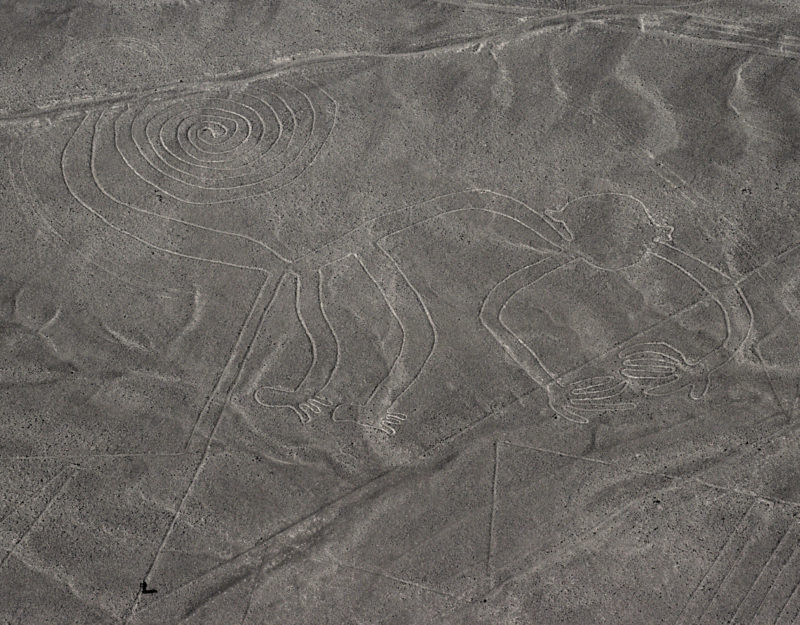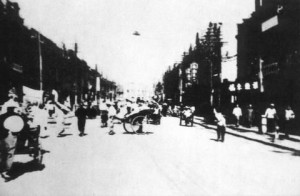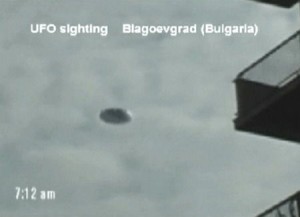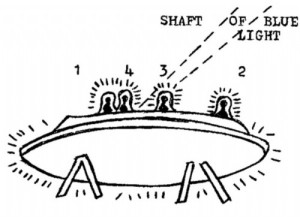THINK ABOUTIT SIGHTING REPORT
Date: February 3, 1972
Sighting Time: early that morning
Day/Night: daylight
Urban or Rural: Rural
No. of Entity(‘s): 1
Entity Type: Humanoid
Entity Description: a man of average height, wearing green clothes under a transparent space suit
Hynek Classification: CE-III (Close Encounter III) Close observation with animate beings associated with the object.
Duration:
No. of Object(s): 1
Size of Object(s): 15 meters (50 feet) long and four meters (13 feet) high
Distance to Object(s):
Shape of Object(s): disc
Color of Object(s): silvery
Number of Witnesses: two
Source: The Mysteries of the Andes by Robert Charroux, Avon Books, New York, N.Y., 1977, page 171. Also, Reparaz’s Guide to Peru, Ediciones de Arte Rep, Editoriales Unidas S.A., Lima, Peru, 1974, pages 210 to 215
Summary/Description: The two feed dealers hiked across the desert. As they closed in on the spot, the sun dazzle lessened, becoming a shiny gleam on the mirror-like silver surface of a large disc. Excitement had Adolfo’s heart pounding. “Caramba! Un disco volante!” It was a flying saucer, all right. What ufologists call “a daylight disc.” The object rested on a tricycle landing gear. There was no sign of any lights, windows, or openings. Later they described the craft as 15 meters (50 feet) long and four meters (13 feet) high. Its surface was so highly polished that their gaze rebounded painfully from the sun’s reflection.
Full Report
On February 3, 1972, one of Peru’s most famous UFO encounters took place. It happened in broad daylight and the saucer’s alien occupant was seen by the two human witnesses.
It all began early that morning in Puquilo, a desert town about 500 kilometers (300 miles) south of Lima. Tito Rojas and Adolfo Penafiel owned a feed store, and they had a delivery to make that day. So before the hot summer sun climbed too high in the cloudless blue sky, the men loaded up the flatbed of Tito’s pickup truck and set out for Nazca, some 50 kilometers (30 miles) to the north. With the truck’s windows rolled all the way down, hoping to catch a breeze off the Pacific Ocean, Tito and Adolfo drove north on the Pan-American Highway. On both sides of the road, a mono-color landscape of brown sand and jagged rocks met their gaze, with the rugged cordillera rising on their right. As they were crossing the desolate Pampa Carbonera south of Nazca, the truck’s radio, which had been tuned to a station in Arequipa, began to act up. The Latino music faded in and out. Bursts of static obliterated the music. Finally, the radio started emitting just static, and then it went silent. “Not again!” Tito said, and he thumped the dashboard with his right fist. “Maybe it’s the antenna,” Adolfo suggested.
Suddenly, the pickup truck’s engine began missing on all cylinders. “Now, what!?” Tito swore, stepping down hard on the gas pedal. The engine raced, but the truck didn’t respond. Swiveling the stick-shift, Tito tried for a lower gear. The engine continued to sputter and cough. Finally, it quit completely, and Tito coasted over to the sandy shoulder of the highway. “It might be the gas filter,” Adolfo said, as they left the truck’s cab. “I think it’s the battery,” Tito replied, “The radio is out. So is the door light. I hope it’s a bad connection.” “Why do you say that?” “Because if we need water, we’ve got enough,” Tito said, gesturing at the leather bota (water jug–J.T.) dangling from the gun-rack. But it will take all day and all night if it has to recharge by itself.”
Lifting the hood (bonnet in UK–J.T.), Tito licked his thumb and pinky finger and touched the battery’s terminals. He let out a fierce yelp. “Madre de Dios!” He shook his hand gingerly. “That wasn’t the problem.” Adolfo, who had been looking toward the rugged Quebrada of the coast range, pointed suddenly. “Look!”
“Look at what?” the driver replied. “Out there on the pampa.” Adolfo squinted against the morning sun’s glare. “I think it’s a car.” “A car!? Out there!?” Exasperated, Tito turned to that direction. “You’re seeing things. There’s no way a car could have driven…” Tito let the rest trail off. He had seen it, too. A silvery gleam in the midst of the dwarf sand dunes. Shading his eyes, he added, “You’re right. There’s something out there. What the hell is that!?” “Let’s find out,” Adolfo said, slip-sliding down the highway embankment, kicking up a miniature avalanche of pebbles and sand.
The two feed dealers hiked across the desert. As they closed in on the spot, the sun dazzle lessened, becoming a shiny gleam on the mirror-like silver surface of a large disc. Excitement had Adolfo’s heart pounding. “Caramba! Un disco volante!” It was a flying saucer, all right. What ufologists call “a daylight disc.” The object rested on a tricycle landing gear. There was no sign of any lights, windows, or openings. Later they described the craft as 15 meters (50 feet) long and four meters (13 feet) high. Its surface was so highly polished that their gaze rebounded painfully from the sun’s reflection.
At that moment, to add to their surprise, the craft’s occupant rounded the front of the saucer. Adolfo described the alien as “a man of average height, wearing green clothes under a transparent space suit.” Instantly Tito and Adolfo began running towards the saucer. They hurried “to the place to greet the strange visitor. But as soon as he saw them, he stopped his inspection of the pampa and took off.” “The saucer rose into the air with a shrill metallic whine, a sound familiar to the people who live in the area, which would seem to indicate that the pampa is a landing field for extraterrestrials.” Tito and Adolfo watched as the disc rose into the sky at a nearly vertical angle and disappeared. After it was gone, they returned to the truck. On impulse, Tito put the key in the ignition, pumped the gas pedal, and switched on.
The truck’s engine responded without hesitation. The Arequipa radio station came back loud and clear. The Tito Rojas/Adolfo Penafiel case was the first of Peru’s great UFO flap of the early 1970s.




Related Reports
1952: 3 “mummy like” beings seen in Peru
1952: Customs Inspector Films Large UFO
1954: Ayacucho Perú Encounter